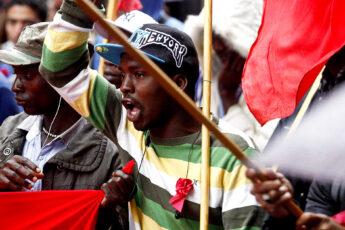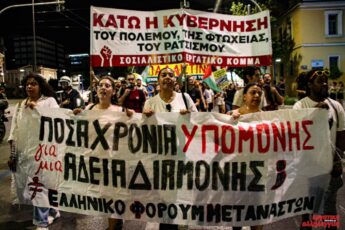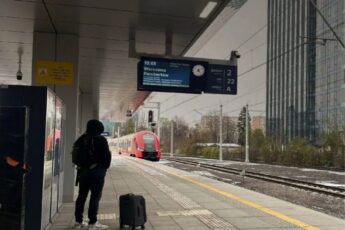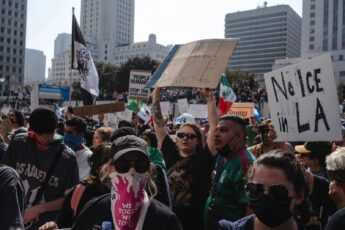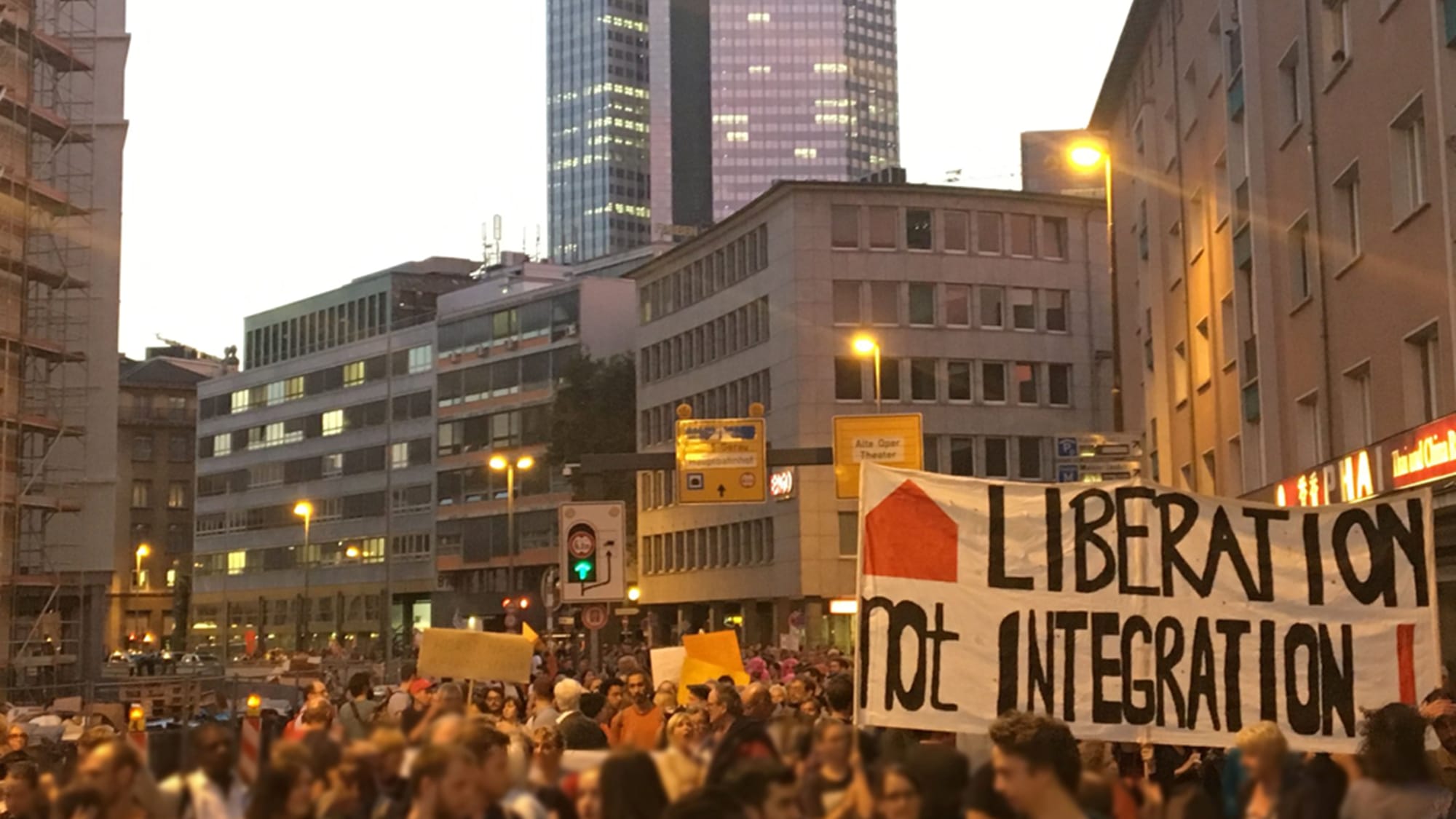
by TRANSNATIONAL MIGRANTS COORDINATION
We publish an interview with Salma, an activist in the migrant and anti-racist organisation Project Shelter. The organisation was born in Frankfurt am Main to help migrants who could not find a place to sleep, and over the years, it has helped them get their documents and fight against racism: in the housing market, the job market, and the institutions.
In Germany, as elsewhere in Europe, migrants have to fight every day against institutional racism, which, in a vicious circle, links housing with residence permits and works so closely together that if you lose one, you risk losing the other two. Moreover, the national management of migration in the EU means that migrants who have been working elsewhere in the EU face serious difficulties in renovating their residence permits once in Germany because of bureaucratic requirements. Bureaucracy in general is a major obstacle to migrants’ freedom: it takes a long time to get an appointment, and the residence permit is often issued after it has expired. For these reasons, Project Shelter, together with other organisations across Germany, organized demonstrations against the immigration office (the ‘Ausländerbehörde’) to protest against racist laws and practices that make the lives of migrants increasingly difficult.
The war in Ukraine and the different treatment of Ukrainian refugees have clearly shown that the only reason why state and European laws are harsh on migrants coming from outside of Europe is because of the colour of their skin and the need for a cheap and fragmented labour force. As Salma makes clear though, the connection between migrant and anti-racist movements already exists, but it also needs to be organised and re-organised. Overcoming divisions and fragmentation among movements, at national and transnational levels, is our current challenge for a stronger and more successful fight against racism.
***
TMC: Can you tell us about your organisation? When was it born and in response to which problems?
SALMA: Project Shelter was born in 2014, in response to the careless management of migrants by the city of Frankfurt during the crisis in the whole European Union. After arriving in Frankfurt, many migrants had nowhere to go for orientation, how to get a job, or where to sleep. Some of those migrants slept inside the Gutleut church, in the Gutleut neighbourhood in Frankfurt, and it became a place where they squatted. This was the beginning of Project Shelter.
Later on, we started to see that it was becoming something really huge. We started organising sleeping places for people who needed them, for example, the migrants sleeping on the street and under the bridge along the river Main during winter. This was also a response to the racial profiling by the German police.
We started forming unofficial gatherings that later on became official. We then started meeting every Thursday and organising accommodation in solidarity, being private people’s couches or weekend sleepovers at soli places. Until 2016, when we occupied an empty 4-floor building in Bornheim Mitte. We were allowed to use only the ground floor as cafe and meeting place, but not for sleeping. In winter 2016, our cafe space got attacked by people who described themselves as anti-migrants. We had many negotiations with the Frankfurt city. They told us that migration is not a problem here in Frankfurt. They did not see that people were sleeping in the street and that it was very difficult for them to integrate into this society.
We worked together with solidarity structures in Frankfurt to organize a big demonstration to show the city how we can turn the hundreds of empty flats in Frankfurt into livable spaces for people who are excluded by the state structures.
Living here in Europe, if you are denied access to a job, it means that you’ve been disabled or you’ve been put into a cage. Most of our people are facing this Vorrangprüfung law [law of priority control], which means that if you worked abroad, you can’t have access to a job here in Germany, and that is one of our main struggles that we are fighting at the moment. The Vorrangprüfung law does not target all migrants in the same way but specifically migrants who are coming from other European countries with unlimited residence permits. This law affects most Project Shelter members because it requires newly arrived migrants who possess unlimited residence permits from other EU countries to submit a working contract and house address to the Ausländerbehörde. As you know, no one will give you a job contract if you don’t have a house address, and no one will rent you their flat if you don’t have a working contract. This is the vicious circle the Ausländerbehörde forces us through.
After you get these two requirements, the Ausländerbehörde will pass it through very serious scrutiny, which involves asking the job centre if there is someone who does not have a job and depends on the job centre and whether he can do that job. If yes, the job will be given to him, and you will be asked to submit another working contract. All this process is supposed to end in three months. If it is over without a visa approval by the Ausländerbehörde, then, either you deport yourself voluntarily, or you risk not entering the country for long periods if the state deports you to the other EU country from which you hold the residence permit.
Legal oppression and exploitation take place mostly in the cleaning, gastronomy, and construction sectors. Because within the first year, the visa is bound to the working contract, if you have any issues with your boss at work, you risk losing the working contract, and if you lose the working contract, you lose the Visa automatically. So, business owners see clearly our vulnerability and they exploit it. For example, they make us work for 8 hours, but they pay only 4 hours, there are no holidays and we have to work even if we are sick.
Among all the struggles, this is one that we are working to get rid of, but you know how difficult this is! There are only a few people in the city who are aware, and without awareness we can’t organize the masses around it.
Since last year, together with other solidarity partners, we have been able to get an old facility with rooms we turned into living spaces, meeting spaces, and neighbourhood cafes. We house more than 40 people and some of them can now start working and living a normal life. They get an address, and so they can start searching for work and move on with their life.
TMC: You are now involved in bigger networks of migrant and anti-racist collectives. What happened in the last months around the Ausländerbehörde? How did you organize?
SALMA: From 2015 onwards, we have organised protests, and invited solidarity organisations like Seebrücke and other groups, and they have joined us for demonstrations. We are also connected with other anti-racist organisations in Germany to protest and create awareness of the situation going on between the Ausländerbehörde and migrants.
The process of acquiring a working permit, which determines our life here in Germany is very long, and the Ausländerbehörde can be very slow in providing documents, sometimes they give documents that are already expiring to migrants. They also complain that they don’t have enough personnel. This institution is an obstacle to migrants’ freedom. Also, if you don’t speak proper German, nobody helps you solve this problem. This problem exists everywhere in Germany, and that is why we started organising demonstrations against the Ausländerbehörde.
We went in front of the Ausländerbehörde and we did a demonstration, and other organizations joined us. We joined together to become a little bit bigger. As Project Shelter we are now involved in a German-wide network, and we will do a weeklong demonstration, German-wide, against the Ausländerbehörde.
TMC: How immigration policies have changed in the last year or so in Germany? Do you think the war has had some effects in terms both of policies but also in general in levels of everyday racism migrant people experience at work, in the streets, and in the housing market? Do you think there have been some changes recently?
SALMA: Well, there have been some changes, but they have not been positive ones for us. At the beginning of the war in Ukraine, Ukrainian refugees were given a higher priority than other refugees here and of course, everybody could feel it. Ukrainian migrants can go to centers like the Ausländerbehörde or health insurance centre like the AOK and speak their own language and get every service. They obtained working permits very fast, so they could start their lives in Germany. We have never had that, even if we were coming from war zones.
That was a very direct message to say that, you know, this is white and this is black, and we could understand that. But of course, what can we do against it?
TMC: What are now the challenges for the campaign against Ausländerbehörde? What do you think is needed to gain more power? Also, what do you think about the last demonstration that happened in Germany, the one against AFD?
SALMA: Ausländerbehörde is a state institution that just implements laws. They don’t make the law against migrants, but they implement it. The challenge that we have is that migrants face a big problem, and we locally have little power to face it because only demonstrating against the Ausländerbehörde is not enough. So that’s the first challenge.
We, as a Project Shelter, did not mobilise or organise for this year’s demonstration against the AFD. We rather joined a demonstration that was already ongoing. We don’t have the biggest number at the moment. We don’t have big capacities to organise such a demonstration on our own.
I have a feeling that most of the anti-racist groups here in Frankfurt are divided. You know, they are really divided. They cannot come together and increase the numbers so to make the AFD smaller and less important.
TMC: From the perspective of grassroots movements, do you think that division is reflected also in the way movements organize together and build an alternative force? Also, how would you see the possibility of connecting migrant and anti-racist movements transnationally?
SALMA: Well, I think that’s very important. If migrant and anti-racist movements are really connected everywhere I think it would be much more powerful. We need to organize this connection. We can do it by providing financial support to set up solid grassroots structures like offices with people working full-time and getting paid so that people work at their full capacity to connect other migrants and anti-racist movements transnationally.
Like, to say Project Shelter is anti-racist movement, and at the same time, Project Shelter is a migrant and non-migrant movement. To connect these movements internationally, I will say, of course we need resources and incentives to motivate the workers who are dedicated to this work. It will be really cool to have an international organisation, like Project Shelter connected to your organisation. To make a demonstration something very meaningful, you need numbers, you need people to join the protest and to join the movement. That will make the demonstration much more powerful and the news will be able to absorb it.


